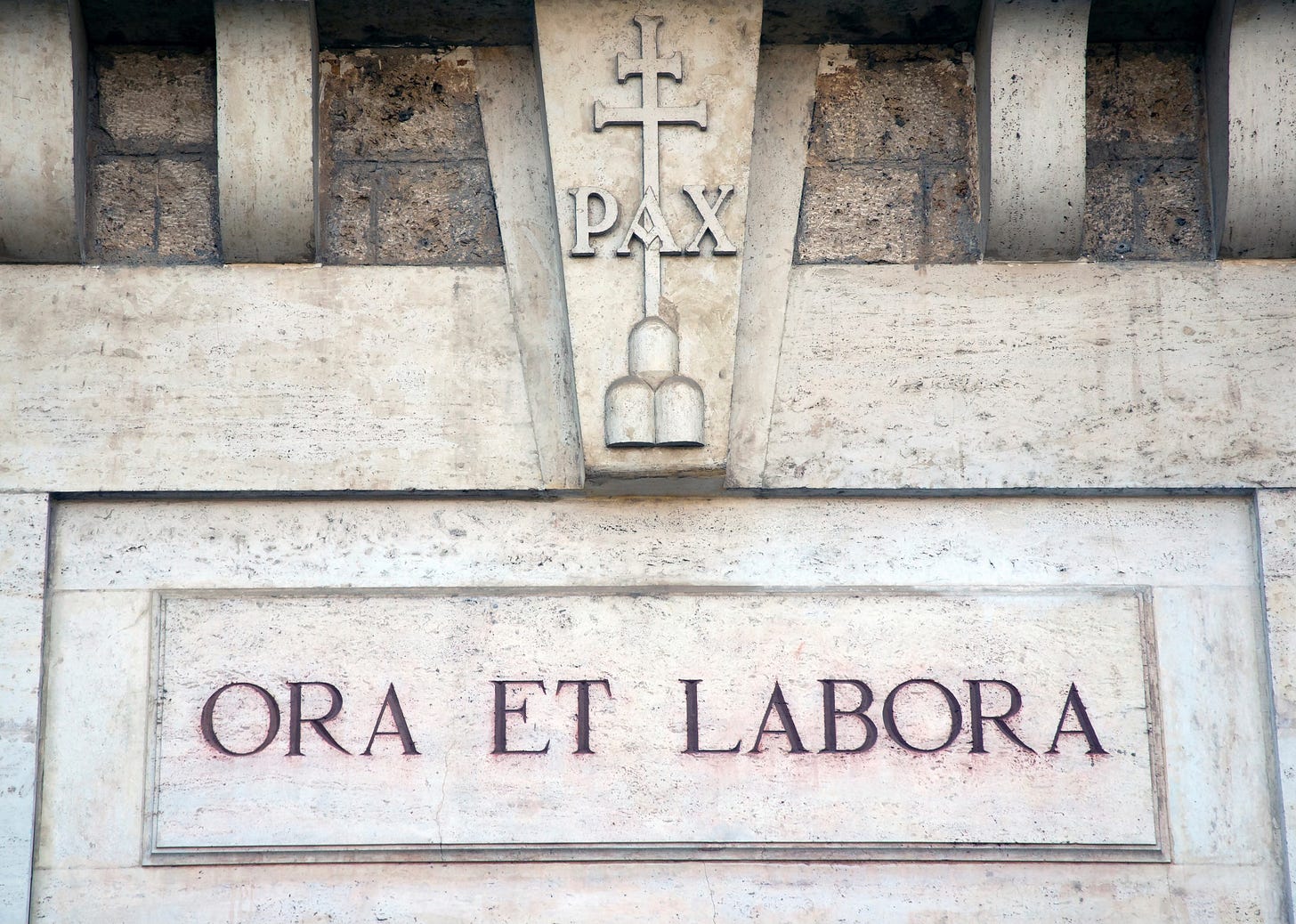Work Hard, Pray Hard
Recovering the Sacred Rhythm of “Ora et Labora”
“Work hard, play hard.” It's a phrase we hear everywhere. It’s on bumper stickers, coffee mugs, and LinkedIn profiles. It is the unofficial slogan of high achievers, productivity junkies, and Silicon Valley start-ups. On the surface, it offers a seemingly healthy balance: give your all at work, then release your energy with equal intensity. But beneath the surface, something is breaking.
Increasingly, people are working harder than ever and discovering that the “play” no longer restores them. Leisure becomes an escape. Rest turns into performance. And we end up not renewed, but drained.
Is this truly the rhythm we were meant for?
The Rhythm That Forms the Soul
Long before industrial clocks and hustle culture, Christian monasticism offered a different cadence: Ora et Labora—prayer and work. Though the exact phrase does not appear in the Rule of St. Benedict (ca. 516 AD), the rhythm saturates every page. Benedict writes, “Idleness is the enemy of the soul,” prescribing a daily structure that balances communal prayer, sacred reading (lectio divina), and manual labor.1
This rhythm wasn’t about productivity for the sake of productivity. It was spiritual formation—training the body and soul to move in harmony with God.
This vision profoundly shaped Anglican spirituality. Morning and Evening Prayer, the Daily Office Lectionary, and the Book of Common Prayer all reflect this sacred balance of work and worship. Our tradition teaches that proper rest comes not from the absence of labor but from the presence of God in the midst of it.
In a world obsessed with output, this ancient rhythm might just be what we need most.
Work Hard, Play Hard: The Modern Mantra
The phrase “work hard, play hard” was first recorded in 1827 by William Newnham in An Essay on Superstition, describing it as “the great principle of our forefathers.”2 Interestingly, an Episcopal priest and educator, James DeKoven, later reframed it as “Work hard, play hard, pray hard”—hinting at a fuller integration of spiritual life.
In contemporary usage, however, the “pray hard” part has dropped off entirely.
Psychologists have observed a strong correlation between high achievers and individuals who engage in intense leisure activities.3 The same drive that fuels workplace success often demands extreme recreation—travel, thrill-seeking, digital escape. However, many critics note that this rhythm often leads to burnout rather than flourishing. Leisure becomes another arena for achievement. “Play” is curated for Instagram, not for rest.
As the same study observed, “This lifestyle often results not in restoration but in exhaustion masked as entertainment.”*
What’s missing in our modern lives is not another vacation.
What’s missing is communion with God.
Jesus and the Rhythms of Prayer
In contrast to modern patterns of burnout, the Gospels present a profoundly different model of integrated life: the life of Jesus Christ.
Jesus’ ministry is punctuated by regular, intentional withdrawal into prayer.
He rises early to pray (Mark 1:35).
He spends the entire night in prayer before choosing the Twelve (Luke 6:12–13).
After healing crowds, he retreats to desolate places (Luke 5:16).
Before his betrayal, he prays in the garden with such anguish that he sweats blood (Luke 22:44).
For Jesus, prayer was not a break from ministry. It was the source of ministry.
“Jesus’ prayerful retreat is not simply rest; it is communion with the Father, sustaining and directing His mission.”
—Rowan Williams4
“Prayer and work are not opposites but two sides of the same vocation—our engagement in God’s renewing purposes.”
—N. T. Wright5
Jesus did not “work hard and play hard.” He worked faithfully and prayed deeply. And in doing so, He revealed a sacred rhythm that reshapes not just our schedules but our souls.
Toward “Work Hard, Pray Hard”
What if your days began not with emails and anxiety, but with liturgy and stillness?
What if work flowed from prayer, rather than pushing prayer to the margins?
The wisdom of Ora et Labora offers a practical and deeply theological invitation:
Sanctify the workday with short prayer breaks
Reclaim daily prayer through Morning and Evening Prayer
Practice contemplative presence with breath prayers or lectio divina.
Keep a Sabbath not as a productivity hack, but as a holy resistance to the tyranny of urgency.
In this rhythm, work becomes an offering. Prayer becomes a wellspring. And the soul learns to breathe again.
This is the Way
In an anxious and overextended world, recovering the sacred rhythm of Ora et Labora is not a luxury—it is a necessity. The solution to burnout is not better vacations, but deeper communion. The answer to restlessness is not escape, but presence.
If Jesus needed silence and solitude, so do we. If Jesus offered His labor in union with the Father’s will, so must we. Perhaps your next step of obedience is not to work less, but to pray more.
Work hard. Pray hard.
This is not merely a slogan; it is a sacred rhythm.
This is the way of St. Benedict, and (more importantly) it is the way of Christ.
María Pía Chirinos, “Ora et Labora: A Balance Between Prayer and Work,” PPKE Publications, 2017.
William Newnham, An Essay on Superstition, 1827.
Lonnie Aarssen and Laura Crimi, “Work Hard, Play Hard: Attraction to Effortful Work and Leisure Activities,” The Open Psychology Journal, 2016.
Rowan Williams, The Way of St. Benedict (London: Bloomsbury, 2020).
N. T. Wright, “Freedom and Framework,” ntwrightpage.com



Well done. I love it when you talk Latin!
Thanks for writing, brother.